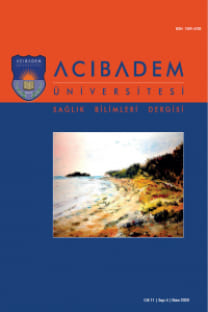Adjuvan Kemoradyoterapi Uygulanan Mide Kanserli Hastalarda Prognostik Faktörler
Prognostic Factors In Gastric Cancer Patients Treated With Adjuvant Chemoradiotherapy
gastric cancer, chemoradiotherapy, prognosis, stage, lymph node,
___
Jemal A, Bray F, Center MM, Ferlay J, Ward E, Forman D. Global cancer statistics. CA Cancer J Clin 2011;61:69-90.Rajdev L. Treatment options for surgically resectable gastric cancer. Curr Treat Options Oncol 2010;11:14-23.
Bouché O, Ychou M, Burtin P, et al. Adjuvant chemotherapy with 5-fluorouracil and cisplatin compared with surgery alone for gastric cancer: 7-year results of the FFCD randomized phase III trial (8801). Ann Oncol 2005;16:1488-97.
Macdonald JS, Smalley SR, Benedetti J, et al. Chemoradiotherapy after surgery compared with surgery alone for adenocarcinoma of the stomach or gastroesophageal junction. N Eng J Med 2001;345:725-30.
Min C, Bangalore S, Jhawar S, et al. Chemoradiation therapy versus chemotherapy alone for gastric cancer after R0 surgical resection: a meta-analysis of randomized trials. Oncology 2014;86:79-85.
Sakuramoto S, Yamashita K, Watanabe M. Newly emerging standard chemotherapies for gastric cancer and clinical potential in elderly patients. World J Gastrointest Oncol 2009;1:47-54.
Shum H, Rajdev L. Multimodality management of resectable gastric cancer: A review. World J Gastrointest Oncol 2014;6:393-402.
Macdonald JS. Role of post-operative chemoradiation in resected gastric cancer. J Surg Oncol 2005;90:166-70.
Smalley SR, Benedetti JK, Haller DG, et al. Updated analysis of SWOG-directed intergroup study 0116: a phase III trial of adjuvant radiochemotherapy versus observation after curative gastric cancer resection. J Clin Oncol 2012;30:2327-33.
Hundahl SA, Macdonald JS, Benedetti J, Fitzsimmons T; Southwest Oncology Group and the Gastric Intergroup. Surgical treatment variation in a prospective, randomized trial of chemoradiotherapy in gastric cancer: the effect of undertreatment. Ann Surg Oncol 2002:9(3):278-86.
Costa WL Jr, Coimbra FJ, Fogaroli RC, et al. Adjuvant chemoradiotherapy after D2-lymphadenectomy for gastric cancer: the role of n-ratio in patient selection. results of a single cancer center. Radiat Oncol 2012;7:169.
Lim do H. Postoperative adjuvant radiotherapy for patients with gastric adenocarcinoma. J Gastric Cancer 2012;4:205-9.
Soyfer V, Geva R, Michelson M, Inbar M, Shacham-Shmueli E, Corn BW. The impact of overall radiotherapy treatment time and delay in initiation of radiotherapy on local control and distant metastases in gastric cancer. Radiat Oncol 2014;9:81.
Kim S, Lim DH, Lee J, et al. An observational study suggesting clinical benefit for adjuvant postoperative chemoradiation in a population of over 500 cases after gastric resection with D2 nodal dissection for adenocarcinoma of the stomach. Int J Radiat Oncol Biol Phys 2005;63:1279-85.
Zárate RN, Arias F, Bandres E, Cubedo E, Malumbres R, García- Foncillas J. Xeroderma pigmentosum group D 751 polymorphism as a predictive factor in resected gastric cancer treated with chemo- radiotherapy. World J Gastroenterol 2006;12:6032-6.
- ISSN: 1309-470X
- Yayın Aralığı: 4
- Başlangıç: 2010
- Yayıncı: ACIBADEM MEHMET ALİ AYDINLAR ÜNİVERSİTESİ
Hastanede Kemoterapi Alan Hastaların Yaşam Kalitesi ve Bunu Etkileyen Faktörler
Meslek Yüksekokulu Öğrencilerinin Sağlıklı Yaşam Biçimi Davranışları ve Etkileyen Faktörler
Pınar Irmak VURAL, Nazife BAKIR
Onur NUMAN, Nurettin AKA, Fisun VURAL, Ayşe Deniz COŞKUN, Gültekin KÖSE, Ertuğrul Can TÜFEKÇİ
GENÇ İSKEMIK İNMEDE RİSK FAKTÖRÜ OLARAK PROTROMBİN GEN MUTASYONU: BİR OLGU SUNUMU
Dilcan KOTAN, Lütfi ÖZEL, Hızır ULVİ, Recep AYGÜL
APAROSKOPIK ENDOMETRIOMA CERRAHISINI TAKIBEN GELIŞEN KARIN DUVARI ENDOMETRIOZISI: OLGU SUNUMU
Aytekin TOKMAK, Ebru ERSOY, Ümit TAŞDEMİR, Aylin KALINBAÇOĞLU
KOLESTEATOMADA SİTOKERATİN PATERNİNE GENEL BİR BAKIŞ
Adjuvan Kemoradyoterapi Uygulanan Mide Kanserli Hastalarda Prognostik Faktörler
Vildan KAYA, Aylin Fidan KORCUM, Mustafa YILDIRIM, Melek Gamze AKSU, Hasan MUTLU, Beyza Şirin ÖZDEMİR, Ali Aydın YAVUZ
Evde Bakım Hemşirelerinde Tükenmişlik
Hülya SARSILMAZ, Yasemin YILDIRIM, Çiçek FADILOĞLU
Derin Beyin Stimulasyonlu Olguda Koroner Arter Bypass Cerrahisi ve Anestezi Deneyimimiz
Muharrem KOÇYİĞİT, Elif AKPEK, Ahmet Ümit GÜLLÜ, Şahin ŞENAY, Cem ALHAN
Transfüzyon İkileminin Çözümü: Doku Oksijenasyonu ve Kritik Hemoglobin
